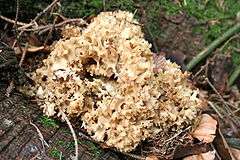Sparassis crispa
| Sparassis crispa | |
|---|---|
 | |
| Sparassis crispa | |
| Scientific classification | |
| Kingdom: | Fungi |
| Division: | Basidiomycota |
| Class: | Agaricomycetes |
| Order: | Polyporales |
| Family: | Sparassidaceae |
| Genus: | Sparassis |
| Species: | S. crispa |
| Binomial name | |
| Sparassis crispa | |
| Synonyms | |
|
Clavaria crispa Wulfen (1781) | |
| Sparassis crispa | |
|---|---|
|
| |
| smooth hymenium | |
| no distinct cap | |
| hymenium attachment is irregular or not applicable | |
|
lacks a stipe or is bare | |
|
spore print is white to cream | |
| ecology is saprotrophic | |
| edibility: choice | |
Sparassis crispa is a species of fungus in the genus Sparassis. In English it is sometimes called cauliflower fungus.[1]
Description
S. crispa grows in an entangled globe that is up to 24 in (61 cm) in diameter. The lobes, which carry the spore-bearing surface, are flat and curly, resembling lasagna noodles and they are coloured white to creamy yellow. When young they are tough and rubbery but later they become soft. The odour is pleasant and the taste of the flesh mild.
The spore print is cream, the smooth oval spores measuring about 7 µm by 5 µm.[2]
This species is found growing at the base of conifer trunks, often pines, but also spruce, cedar, larch and others. It is fairly common in Great Britain.[3]
Culinary use
It is considered a good edible fungus when young and fresh[2], though it is difficult to clean (a toothbrush and lots of running water are recommended for that process). One French cookbook, which gives four recipes for this species, says that grubs and pine needles can get caught up in holes in the jumbled mass of flesh. The Sparassis should be blanched in boiling water for 2-3 minutes before being added to the rest of the dish. [4][1]
References
- 1 2 Roger Phillips (1998). Mushrooms and other fungi of Great Britain & Europe. Cavaye Place, London SW10 9PG: Pan Books. p. 255.
- 1 2 Marcel Bon (1987). The Mushrooms and Toadstools of Britain and North-western Europe. 7 Bond Street, St. Helier, Jersey: Domino Books Ltd. p. 308. ISBN 978-0-340-39935-4.
- ↑ Geoffrey Kibby (2017). Mushrooms and Toadstools of Britain & Europe Vol. 1. Geoffrey Kibby. p. 82.
- ↑ Frédéric Jaunault, Jean-Luc Brillet (1981). Toutes les bases de la cuisine aux champignons (in French). 13 rue du Breil, Rennes, France: Editions Ouest-France. p. 183. ISBN 2 7373 2275 8.
| Wikimedia Commons has media related to Sparassis crispa. |